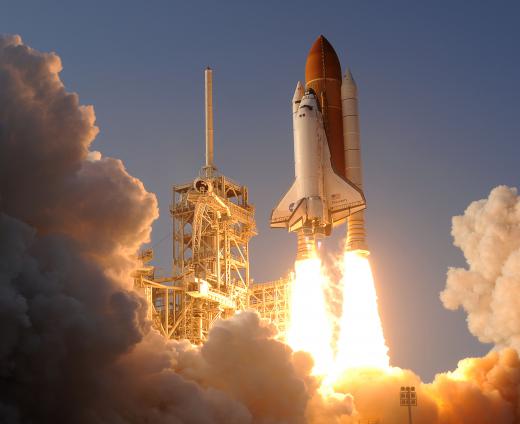How does NASA Research Affect my Life?
 Tricia Christensen
Tricia Christensen
There is continued speculation regarding funding of the US Space Program and NASA research in general. Planning future explorations in space is expensive, but many counter by arguing that research needed to continue programs like NASA has benefited people in numerous ways. One of the keenest arguments for continuing research is to list the number of ways in which it has affected daily life. We owe many modern inventions we take for granted to NASA.
Some NASA research has led to distinct improvements in medicine. Among these, we owe the development of magnetic resonance imaging (MRI) technology, which allows for a much clearer picture of certain body systems. Laser technology developed by NASA has been used to create laser eye surgery. Neuromuscular stimulation is used to help people with spinal injuries, and the ocular screening system developed by the US space program has made eye examinations a much simpler process. Many prosthetics for people who have lost limbs owe part of their design to materials invented or developed by NASA.

Research has also led to one of the most important devices all people should have in their homes: smoke detectors. Smoke detectors save lives regularly, reducing injury and warning people so they can get out of homes or other structures when a fire is first detected.
We owe many of our ergonomically designed desks, chairs and workstations to NASA research. Similarly, if you enjoy watching TV streamed in from your satellite dish you should thank space research programs. Taking a jog with good running shoes is the work of research in space, and when you finish that jog with a drink of freshly purified water, you can thank NASA too, since technology they developed led to today’s most popular water filters for home use.
Other things developed that may affect daily life include the following:
- the development of memory foam, now widely used in mattresses;
- the creation of lights that mimic the sun to help people who suffer from Seasonal Affective Disorder;
- materials used in clothing that are fire-resistant or are better at keeping in heat;
- invisible braces, which are an offshoot of special ceramics used to make spacecraft stronger

While explorations in space by NASA and other space programs may seem to be a waste of money to some, it can be argued that the research required to create continued advances is not a waste to most people. Products that were developed based on research by NASA are used by many people on a regular and sometimes daily basis.
AS FEATURED ON:
AS FEATURED ON:




















Discussion Comments
I would rather disband NASA and fund social programs across America.
I am so glad that NASA research projects resulted in the development of memory foam. This stuff made falling asleep so much easier for me and for millions of people around the world.
I had a lumpy mattress that just wasn't very soft, but I couldn't afford a new one. I was able to buy a two-inch thick topper of memory foam that transformed the bed into something so comfortable that I couldn't stay awake on it.
Memory foam pillows accomplish the same thing. I never would have thought that the answer to my insomnia would have come through NASA's research, but I'm so thankful that it did!
@ValleyFiah - I can understand your practical argument, but I think that NASA should have never abandoned their astronaut program. They may not lead to many new discoveries, but they were a representation of NASA. The word astronaut evokes very emotional images in the imaginations of many Americans. NASA's astronaut program helped to unify a nation torn by Vietnam, shaken by the fight for civil rights, grieving from the assassinations of some of history’s most prolific figures, and scared to death of the apocalyptical implications of a generation long cold war. The Apollo missions created America's idyllic view of science and innovation, and made the astronaut a true American hero. Every kid in America wanted to be a firefighter, doctor, or astronaut. These are the types of images needed to advance science. Kids need to be able to believe that they might be the first person to walk on Mars. Space exploration offers a link between science and theology; a direct bridge to the unknown. The symbolism of the star throughout human history is what makes the dream of space travel so exciting. Nobody ever dreams of making their life’s work controlling an unmanned drone into deep space.
This is a great article! There are a lot of inventions that I never knew were developed by NASA. When I think of NASA's contribution to everyday life I think about aerodynamics, airplane technology, military equipment, and advanced materials. I also think of all the contributions to astronomy, cosmology, and physics made by NASA. Everybody always talks about the lunar missions, space station, and mars mission, but I like to think about the Hubble telescope or the discoveries about the origins of the universe. There is debate over whether or not the President should have scrubbed NASA's return to the moon, but I applaud the shift of focus to exploration of the outer solar system, unmanned missions, and technology development. Manned missions require extra planning and considerable amounts of funding; they are also impractical for long missions. I also think constant missions ferrying satellites to space are a waste of talent. The technology used to transport materials to the space station, and launch satellites is mature; making it an ideal job for commercial carriers. Unmanned mission may not be as glorious as a mission to the moon, but the focus on new discoveries is necessary. Until the technology is available for manned deep space missions is available, I believe we will have to settle for NASA's current mission directives.
Post your comments